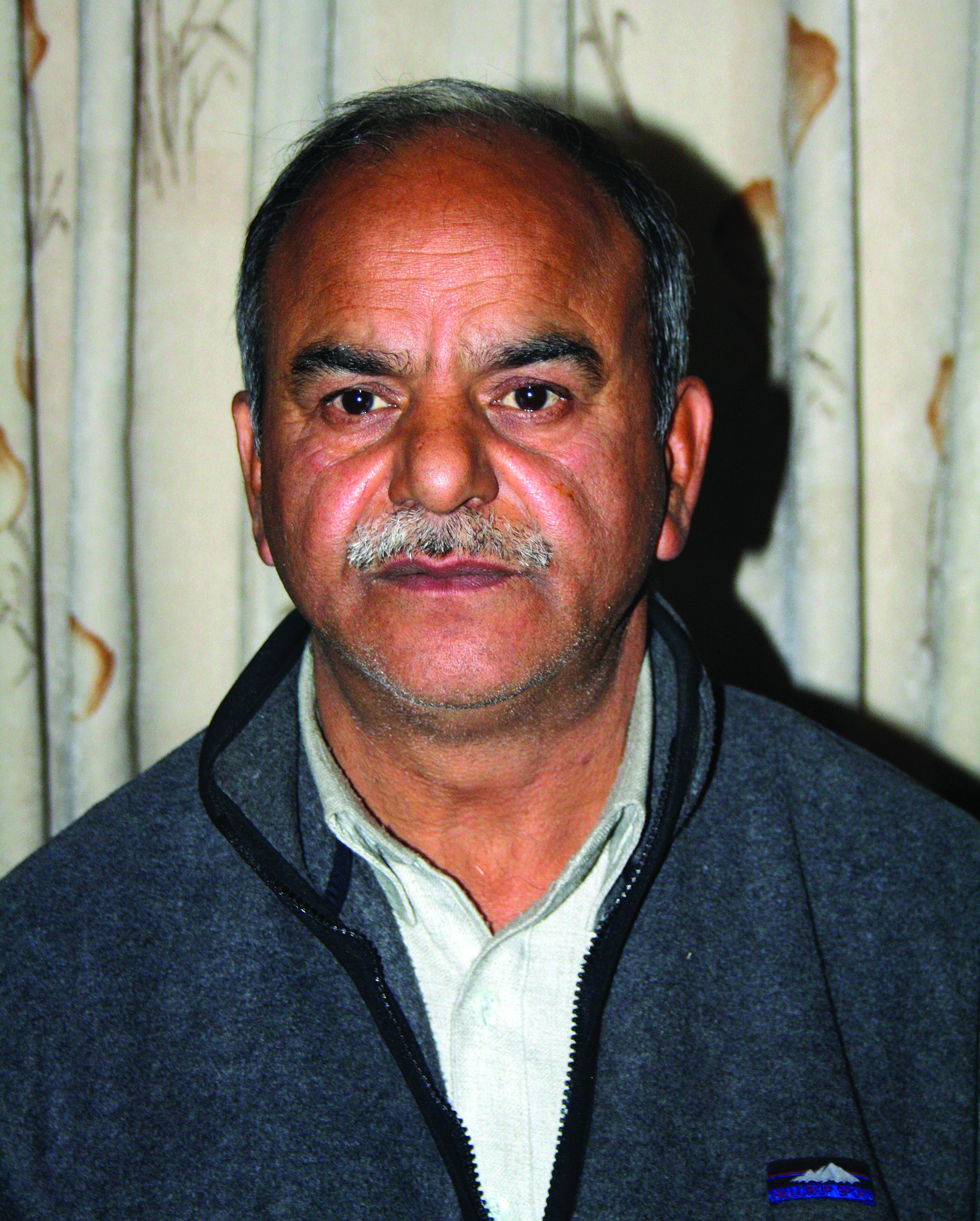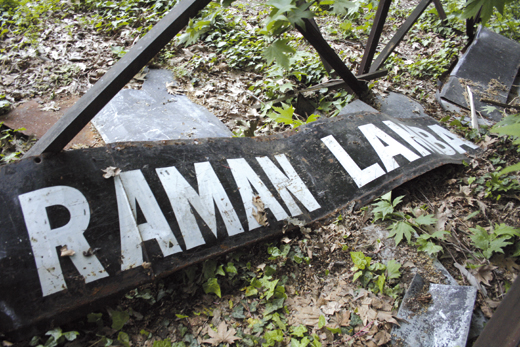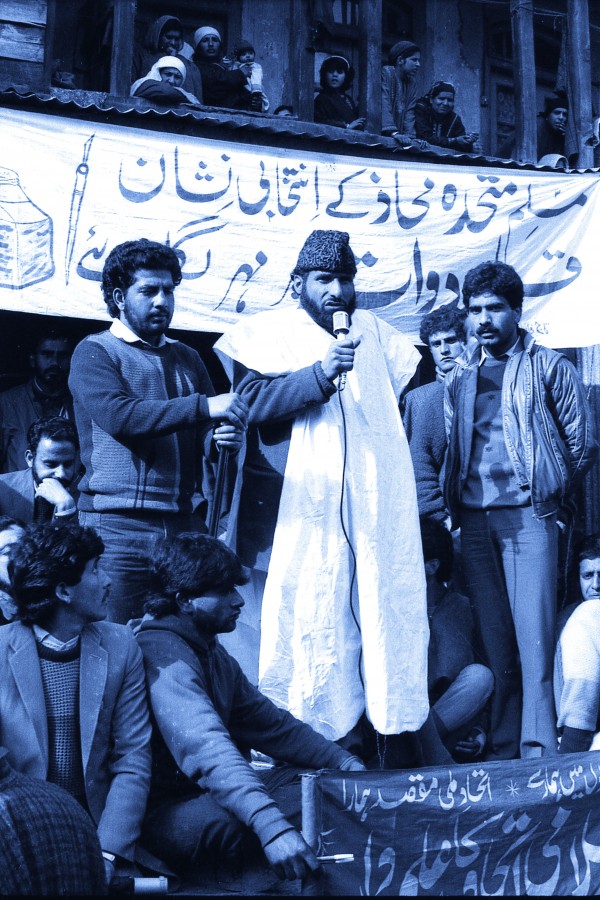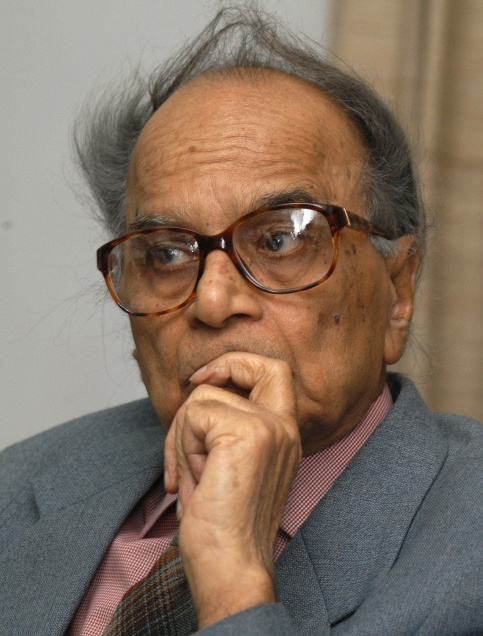Associated with the blood soaked Srinagar dateline, Ali Mohammed Sofi had providential escapes many times while reporting from Kashmir. Post retirement he talks to Ibrahim Wani about his 40 years in journalism.

As Ali Mohammed Sofi made his way to the office on the first day of work, his mind kept asking him the same questions. “How would people see me in this new profession?” The year was 1968. In those times, people from his community were not interested in the profession he had chosen. They hardly considered it one.
“At that time the profession of journalism, and that too English journalism, was one where there were hardly any local Muslims,” he remembers, “And there were very few… you could count them on your fingertips.” The profession was dominated either by people from the mainland, or Kashmiri Pandits.
When Ali Mohammad Sofi, brimming with youth entered the PTI office for the first time, a new world opened for him. “I joined just as a teleprinter operator,” he says.
Sofi had developed an interest in journalism, when a teacher in his 8th class, after seeing an essay written by him, had told him that he had an aptitude for it. After passing my FA, Sofi joined journalism.
The profession did not pay much. His salary, when he joined was only 150 rupees. “This was meagre,” he says. For the first six months, he had to be content with just operating the teleprinter. His break came when he was assigned the sports beat. “It came early for me. For others it would take around two years.”

Sofi would cover Ranji cricket in the valley, football matches. “At that time, in contrast to today, there was a lot of sports activity,” he says. For excellence in sports reporting, he received a gold medal for outstanding coverage of sports in Kashmir in 1976. This was among the many to follow. But soon, Sofi would hop on from sports to other beats. “Those were interesting times. And the things other than sports were much more exciting.”
Interestingly, it was a cricket match, which turned up the heat in the political arena. “It was one of those games, where it was more of politics than sports,” he says.
The India-West Indies cricket match at Srinagar. “There was tight security, and the who’s who of Kashmir had come to attend. The stadium was jam packed,” he remembers. In the match, West Indies batted first and the crowd cheered them throughout.
But when India came to bat, they faced a hostile crowd. “The situation precipitated when some people like Shakeel Bhakshi, Mushtaq-ul-Islam, inspite of the security, intruded into the field, and dug the pitch,” recalls Sofi. The match could not be completed, and was awarded to West Indies for better scoring rate.
The statements made by the two captains after the match are still fresh in his mind. He says, “Commenting on the crowd support for the West Indies, their captain Clive Llyod had said that ‘they had felt as if they were playing at home’. More interesting was the statement by Kapil Dev – the Indian Captain. He had said that ‘even though they had played in Pakistan, they had never encountered such a hostile crowd’.”
Sofi was assigned to cover the dismissed chief minister. This was Sofi’s first big assignment in reporting politics. He went wherever Farooq went.
Recalling the episode he says, “Governer Jagmohan called Farooq Abdullah to Raj Bhawan, where he asked him to resign, but an adamant Farooq insisted that he had support of all the members of his party, and refused to resign,” says Sofi, “But then Jagmohan opened a door in the room, and all the 12 members with GM Shah (11 NC rebels, and one independent) were there. Jagmohan then dismissed the reluctant Farooq.”
Sofi has many incidents to recall of the company of the dismissed chief minister. “Wherever he went he carried the resignation of 32 MLA’s of NC with him. He often threatened to submit the resignation,” says Sofi, “but he never did.”
A similar scene repeated in the governor’s office, just 22 months later when GM Shah too was dismissed. Farooq then joined hands with the congress, and fought the elections together. “This was the election which changed everything in Kashmir,” says Sofi.

“All the opposition parties, including Jamaat-e-Islami, People’s Conference and the like, united under the banner of MUF (Muslim United Front) to face NC, congress combine,” recalls Sofi, “but this election turned out to be a tragedy.”
The poll results were rigged and losing NC-Congress combine was made victorious. “People had voted for someone, and someone else was elected.”
And when Rubaya Sayeed, the then home minster Mufti Mohamamd Sayeed’s daughter was kidnapped and then released in exchange of four militants, it scored a big sentimental victory. “More and more people identified with the militants, and their ranks swelled. The HAJI group, the kidnappers which included Ishfaq Majid, Javeed Mir, Yasin Malik, and Hamid sheikh became the darling of the people.”
A number of journalists were attacked, and there would be continuous charges of being sympathetic to one group or the other.
“I survived because of my reports were balanced,” says Sofi, who by this time was the only one left at the PTI office. “All others, had left for the mainland.”

“It has so transpired that the then Governor Jagmohan had called all the journalists representing the national media in Kashmir, and asked them to leave,” says Sofi. “Heeding this call, the staff at PTI, most of whom were from outside or non-Muslims, left for Jammu on March 1, 1990,” recalls Sofi, “They left for a week. No one ever returned.”
He was now a one-man office. “The office would open when I opened the lock in the morning, and would close in the evening, when I locked it again.”
During the Hazratbal siege, the PTI Sofi’s reports were continuously on the front page of national newspapers for one month.
“The biggest causality of my profession was my family life. I would hardly get any time for them,” says Sofi. There had been times when he would not see his family members for long periods. He recalls the 1971 war, between India and Pakistan when he was in his office for 14 days at a stretch. And his home was hardly a few kilometres from his office. A distance he had often covered on foot. He also has other memories from the war. “We saw Indian and Pakistani fighter jets lock horns over the city many times. There was a dog fight just over Lal Chowk once, and a similar fight over Dal Lake,” he recalls.
But the dog fights of the fighter jets were nothing in comparison to the daily conditions in the nineties.
On December 12, 1992, Hizbul Mujahideen in a press release to local newspapers in the morning stating that they had attacked an army convoy in Kupwara the previous day. HM did not usually give press releases to PTI. Sofi had secured one through his contacts at the local newspapers.
To cross check the story Sofi called up the army PRO, who said he would have to check. A few hours later, the army released a press notice, stating that 23 people had died in an exchange of fire in Kupwara. However, by now HM had withdrawn the earlier press statement issued to the local newspapers.
Sofi did the story, and all the national newspapers carried it. But now HM was after him. They in contradiction to their earlier statement stated that the attack came from the army, and was unprovoked. Soon, the organisation issued a threat to him. Sofi had to restrict his movement.
Reporting from a conflict zone is difficult, and it often involves cross checking at multiple levels. Sofi always stuck to that practice. There were a number of incidents which today draw a laugh from him. In one such Incident K Duraiswami, the managing director of OIC was kidnapped by Hilal Beig, of Students Liberation Front. He would later form the Ikhwan-ul-Muslimeen, from which emerged the Ikhwan-ul-Muslimoon (the renegades).
He demanded the release of six militants in exchange for Duraiswami’s. There was news that militants had been released and so was Duraiswami. Every newspaper and news agency made it their headlines. “I was the only reporter who said that Duraswami was still captive,” he says. “Even the DGM news called me asking, ‘why I had not covered the story’. I contacted Governer GC Saxena, who said that they had set the process in motion by releasing the six militants, but Duraiswami was still captive.”
During those times kidnappings were common. And negotiating was very difficult. Hilal had during the course of negotiations even kidnapped negotiator Nazir Siddique of Qamarwari. “Those were very difficult times. No one knew what would become of him or her. Siddique was killed along with his wife, some years later in an unrelated incident.”
Duraiswami was finally released after one month, in exchange for more militants. Except for PTI, all other local and national newspapers and news agencies carried the news of his release one month early.
There was a similar incident, Sofi recalls. “Javid Mir, commander of JKLF once gave me a call, and claimed that they had carried out a rocket attack on Heevan cinema in Anatnag. I clearly told him that unless the police confirms the story, I will not carry it,” he says. Sofi called the then DG Police, GN Saxena, who denied the news, he didn’t report it. However, the rest of the newspapers and agencies carried it, and it was widely reported.
“The actual attack was carried out the next day, when it was reported in the morning newspapers. It became a big joke,” Sofi said with a smile.
1996 was an important year, in which two rigged elections took place. The first was the parliamentary elections in May. This election was boycotted by the NC. In this election, Congress bagged all the 6 parliament seats. Seeing their plan backfiring, NC came out in full force to fight the assembly elections of September 1996.
This election was made possible by the ruthless Ikhwan-ul-muslimoon, the counter insurgents, who were unleashed on the population by the government. “There were incidents when people were killed just because they knew some verses from the Quran, or they had a beard.”
Ikhwan, and the security forces ensured that voting took place. NC came to power with a two thirds majority. Farooq Abdullah became CM again. Later, a number of Ikhwani leaders were gifted seats in the Legislative Council.
That year Sofi too had a brush with the security apparatus. “I was covering the voting in Batamaloo, when a number of locals complained to me that they had been brought to the place by force. There was a BSF commandant, who was not content with that. He went into a nearby house which only had two women inside. This I could not tolerate. I followed him and dragged him out of the house. Then, along with some of his soldiers he pounced upon me, and beat me severely.” Sofi received injuries in the head, and the body.
The injured Sofi made it his resolve to see to it that AK Joshi the commandant was punished. He reported the incident to the Press Council of India, which initiated an enquiry into the matter. “I even went to Delhi for a hearing,” he says. When the verdict was announced, Sofi’s stand was vindicated. “AK Joshi was demoted and transferred to the north-east.”

Reporting from Kashmir was often full of pain, he says. A person was killed in a bomb attack at Lal Chowk. “We (journalists) had climbed on a vehicle to see what was going on, when the SHO of the police station asked us to come down. We did. We were just a few paces away when another explosion took place killing the police officer.”
There was some close shaves with harm. “Once minutes after coming out of the Assembly along with some friends like Yousuf Jameel, and Imdad Saki when CM had made some statement related to restoration of autonomy, we heard loud explosions and gunfire. We tried to go back, but the area had been sealed by then. The difference of a few minutes saved our lives,” he says.
Sofi was also holed up along with some friends in the office of the DG police, GS Bedi in 1993 during the police revolt in the police control room. “Qaiser Mirza of Voice of America and Altaf Hussain of Times of India, were accompanying me. We asked the IG BSF who was outside the control room if we could go in, and he said yes. As soon as we went in, the complex was surrounded by the BSF and the Army. We were holed up in the office of DG, along with additional DG, in a complex which had 2000-3000 revolting police.”
“We did the story from phone, even when we were holed up inside,” says Sofi. “At around 4.00 am, army stormed the complex and the impasse came to an end, without any causality. Had there been a showdown, a number of lives would have been lost,” adds Sofi.
One more incident which Sofi recalls is the attack on the corps headquarters in Badamibagh. Early in the day the corps commander in a press conference, had said, “Militants have not been able to disturb my afternoon sleep.” It was the same afternoon they attacked. Among the army men killed that day, was the army PRO Purshotam.
Sofi who had started work on the press conference story, started writing a new one. “Kashmir keeps changing every second, and death is always in the air,” he says.
After serving in the field for 40 years, Sofi is not satisfied with the quality of journalism prevalent in Kashmir. “All the newspapers have the same news copied from news agency websites. A number of newspapers even don’t have correspondents,” he says, “If I missed some story, I would do a follow up from a different angle. Today, most would not be bothered.”















